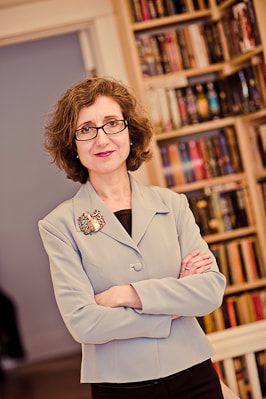Fereshteh Molavi's Thirty Shadow BirdsReviewed by Maria Meindl
|
|
In Thirty Shadow Birds, we meet Yalda, an architect, an ESL teacher and single mother living in present-day Toronto who has conversations with her personal jinn and a phalanx of ghosts, a wanderer obsessed with home, and a survivor of trauma and brutal loss who has kept her dreams and passions alive as she migrated from Iran to Europe, and then to Canada.
For all its ventures into the fantastical, this story is anchored in daily life. Fereshteh Molavi takes us inside Yalda’s skin as she juggles her various roles, staying afloat in a tough city and doing at least a modicum of what she loves. We are with her as she does her make-up in the morning, contends with back pain, drives to work, even as she undertakes her “cleaning therapy,” energetically scrubbing her toilet or facing her son’s “mountain of dirty dishes” that fill their galley kitchen. Even her jinn, her hamzad (born in the jinn world when Yalda was born in this one), visibly ages, blows her nose, bites her nails. The book’s focus on quotidian details reassures us that no matter what is going on inside her, Yalda is getting on with her life. The scenes of Toronto are drawn with a knowing eye, observed from the point of view of a woman who cannot turn off her calling as an architect: a coffee shop, a particular strip of Yonge street, the Beach in the early morning, The clarity of these scenes is in direct contrast to the stew of memories and internal dialogues constantly roiling in Yalda’s mind and heart. Thirty Shadow Birds is a richly allusive book, evoking Attar’s poem The Canticle of the Birds, its thirty chapters reflecting the number of birds who end up making the epic journey. I was hesitant to read it because I knew I would not be able to understand its many layers. I didn’t, but Molavi’s structural choices meant that I could still appreciate it. Yalda is beset by regrets, self-doubts, unfinished conversations. And each of these conversations carries with it a landscape, a particular period in history and politics. Rather than creating a linear sub-plot, Molavi jumps in and out of her past life, based on associations from her present one. This is a risky choice, and it works. As someone who witnessed the book’s political backdrop as nothing but a series of headlines from a distant location, I placed myself in Molavi’s capable hands for this journey, dipping in and out of times and places, anchored by Yalda’s concrete daily struggles. Still, the facts did sink in. This book shows us the larger sweep of history resonating in the most intimate corners of the characters’ lives. This book shows us the dinner table behind the headlines, the office, the bedroom, the nursery. And the product of that nursery. Yalda’s son Nader, now grown into a surly young man, lives behind a literal and figurative closed door. Molavi is unapologetic in her portrayal of Yalda’s rage as well as her pain. Mother and son are scarred by a series of enforced changes and fragmented relationships, of new landscapes that never quite become home. Yalda faces impossible choices, yet her decisions do not just have impact on her own life but on that of her growing son. And Nader chooses the one job that will hurt his mother the most, one that requires him to carry a gun. A gun, she tells him, is “not just a thing hanging from your belt. It’s something that makes you a target to be shot at, or that makes you shoot at a target.” Violence hovers as both a memory and a threat for the future. Yalda is a tormented character, but also a triumphant one, simply because her internal world is so rich with images. And because of her ability to enjoy the daily life which Molavi portrays in such loving detail: the spring breeze, the sun on her face, a bite of fruit, and because of her internal life, which teems with lush poetry as much as with regret. Maria Meindl is the author of The Work (Stonehouse Publishing) and Outside the Box (McGill-Queen’s University Press). She is the winner of the Alison Prentice award for women’s history. Her essays, poetry and fiction have appeared in journals, including The Literary Review of Canada, Descant, Musicworks, and Queen Street Quarterly, as well as in the anthologies The M Word: Conversations about Motherhood and At the End of Life: True Stories about How We Die. She has made two series for CBC Radio’s Ideas: Parent Care and Remembering Polio. Maria is the founder of Draft, a reading series featuring works-in-progress by established and emerging writers. She teaches movement classes in Toronto.
|


